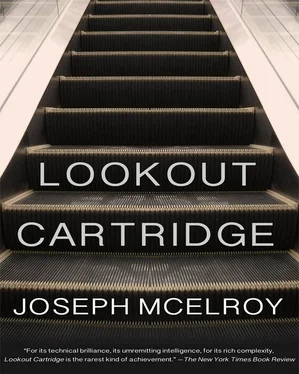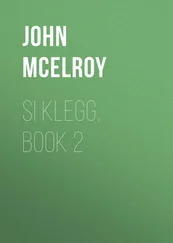Joseph McElroy - Lookout Cartridge
Здесь есть возможность читать онлайн «Joseph McElroy - Lookout Cartridge» весь текст электронной книги совершенно бесплатно (целиком полную версию без сокращений). В некоторых случаях можно слушать аудио, скачать через торрент в формате fb2 и присутствует краткое содержание. Год выпуска: 2014, ISBN: 2014, Издательство: Dzanc Books, Жанр: Современная проза, на английском языке. Описание произведения, (предисловие) а так же отзывы посетителей доступны на портале библиотеки ЛибКат.
- Название:Lookout Cartridge
- Автор:
- Издательство:Dzanc Books
- Жанр:
- Год:2014
- ISBN:9781941088036
- Рейтинг книги:3 / 5. Голосов: 1
-
Избранное:Добавить в избранное
- Отзывы:
-
Ваша оценка:
- 60
- 1
- 2
- 3
- 4
- 5
Lookout Cartridge: краткое содержание, описание и аннотация
Предлагаем к чтению аннотацию, описание, краткое содержание или предисловие (зависит от того, что написал сам автор книги «Lookout Cartridge»). Если вы не нашли необходимую информацию о книге — напишите в комментариях, мы постараемся отыскать её.
Lookout Cartridge — читать онлайн бесплатно полную книгу (весь текст) целиком
Ниже представлен текст книги, разбитый по страницам. Система сохранения места последней прочитанной страницы, позволяет с удобством читать онлайн бесплатно книгу «Lookout Cartridge», без необходимости каждый раз заново искать на чём Вы остановились. Поставьте закладку, и сможете в любой момент перейти на страницу, на которой закончили чтение.
Интервал:
Закладка:
There’d be no film then, said Monty Graf. But I didn’t mean that fire; I meant the bonfire.
Plenty of energy there, I said. But the membership was pretty shifting, and from what we saw there were five or six religions there, not one. But we took the whole image.
Was this film of yours about a quest for identity?
Chewing my bluefish, I closed my eyes as if looking for a bone. I remembered many things. I swallowed, smiled, drank half my beer.
Interesting idea, I said. There was a man in the trees there who thought our film was a quest for him.
Did you preserve him for posterity? said Monty Graf.
You know I did, I said.
So that’s the footage that didn’t get burnt.
No.
Let’s move on, said Graf. What’s your next scene?
We might have shuffled the order in the editing.
But it got burnt first.
Right, I said.
Monty Graf wanted a rundown of scenes. That was nice. And as I forked out the stuffing rich with onion, damp with blackened mushroom, separately so I didn’t get a bone, I wondered what I’d achieved in the time since I landed at Kennedy, which seemed long because it had been short but full — but full of what? There was green in the stuffing. I ate some more preceded on the prongs of my fork by a vinegary beet slice (in England called beet-root and sold in the greengrocer’s already boiled but why?). Why would Monty Graf care what had been on a film that no longer existed?
Well, he said, could you take what you rescued from the fire and start over and make a similar film? I mean with expenses.
I chewed.
He was still hoping, but maybe not for the diary. The blonde in the next booth gave me her profile, I could almost smell the orange and blue-green eyeshadow. Monty had talked of the film, not the diary. Preserved for posterity? or from.
The man in the grove had come from the darkness of trees not really into my sight but into flickering shades, and Jenny had typed the page that told how when he broke from the grove he seemed to come from behind a tree much too slender to hide him, so he seemed to unroll from its trunk. I dabbed a parsley fleck off the silver side of my fish with a fork prong and a bit of chive off the plate.
I could forget the film. And Cosmo’s Indian. And someone named Jan Aut. And Claire. And the camera jamming when we didn’t allow enough loop in the left-hand side of the film feeding from the sprocket-wheel around into the slot between the film gate and pressure plate.
Back over my shoulder I found the man in the steel-rimmed glasses who’d made me a cup of tea looking our way.
Would he be here if Monty was in with Aut? Could I be sure the man in glasses worked for Aut? The boy Jerry had opinions on Aut, and as for the man watching me here from the crowded bar, hadn’t he told Jerry to shut up?
I looked; he seemed to be smiling, but he was alone; I’d seen several people around Manhattan walking along smiling for no outwardly visible reason, not only the blind man — the toucher — also the knapsack girl on Mercer Street smiling up at the lofts.
It was after nine. There was a waitress I hadn’t seen, and she was laughing while she wrote on her order pad. There wasn’t a table or booth vacant.
OK, I said. For what it’s worth. A Softball game in Hyde Park, a bonfire in Wales, a Hawaiian hippie and his girlfriend from Hempstead, Long Island, playing guitar in the London Underground. A suitcase slowly packed. People in a marvelous country mansion doing things inside and outside and ignoring a moonshot on a television set under a table umbrella out on a rainy patio. A Corsican montage featuring an international seminar on ecology. Toward the middle of August, Stonehenge. In the end a U.S. Air Force base. A quick 8-mill. cartridge of some pals of Dagger’s the night we got back from shooting at the base.
You left out the beginning, said Graf.
OK, I said.
The two men in the Unplaced Room. Do they come in again?
No. But yes. They do come in again. They were at Stonehenge.
Sounds a peculiar film. Power , you said?
Power poached on when it had momentum but not focus.
In England.
Some bits maybe had focus. Objects, cuts, quickies, objects for music and voices. A bridge I like.
Objects? What about the pictures in the Unplaced Room?
Brunel’s Clifton Bridge, for instance. We shot it on the way to Wales. Isambard Kingdom Brunei. And hands laying out TNT like a xylophone and then standing each stick up carefully, and fingers dismantling a kitchen timer. The times we live in.
Faces?
Some negative stills too. I was planning to splice them in, printed as negatives. People with black faces and white hair. Stills with voices. Ever think of the sound that goes with a snapshot?
Did you mean a movie sequence using stills?
A few. It’s destroyed.
That negative stuff is a cliché of course.
The black and white might have had a point.
Was this to be a picture of American life abroad?
That may have been Dagger’s idea, I said.
He was in charge of equipment, said Graf.
I was the one who wanted to use slit-scan screening.
I leave the hardware to the filmmaker, said Monty Graf. My thing is collaboration, sort of a mating of the aesthetic and the financial.
You might be of help, I said.
What about Speaker’s Corner in Hyde Park? said Monty — he was being humorous. He sensed something wrong and knew it wasn’t the bleeding beets or glistening bluefish fast disappearing, or my distrust of him. His own task was too tricky for him to see the simple truth that my table of contents had depressed me. I thought of the death camps, of Belsen, of certain photographs — and knew that as an issue or concern in my heart all the dead Jews were cold — what was the matter with me?
What happened at Stonehenge?
Just before the Stonehenge scene, I said, we were going to cut in an elevator down a coal mine in Wales; shoot the sky from a hundred feet down. You have to cut in a shot of a pile of slag or a coal trolley underground, a miner with a headlamp, else that shot of sky could just as well be the end of the Severn Railway Tunnel.
Monty Graf had gotten the waiter to bring a third gin and milk. I imagined dripping a beet into his wide, pure glass. I hadn’t thought until now about the deserter’s reappearance in the unpleasant Stonehenge scene at the end of the film. He and his friend just seemed like the usual supernumerary acquaintances who turn up at Dagger’s parties; I’d noticed them and accepted them.
You said momentum, before, said Monty Graf — so where’s the momentum in the coal-mine shaft?
I don’t know, I said. You want too much consistency.
Just interested. It sounds different. I mean, you never know where you’re going to find the real thing. Always on the lookout. I had a piece of a Swedish film. I promote an annual exhibition at the Coliseum. I do a little real estate.
I’d finished my fish and Monty Graf wanted to know what footage we’d actually had developed. Maybe there was a point of departure there, he was saying; and I was on the point of asking if our friend with the steel-rims was still at the bar, when Monty Graf said, Seven minutes is a lot, you know, even unedited, possibly quite a substantial basis in terms of what you can show on film in terms of time.
He sipped, and I wasn’t sure if I would need him.
I was about to ask where he’d heard seven minutes, but he said, Look I really like the England mingled with America idea, I mean it’s got possibilities right now what with the war and the recession and as it were the decline of America.
I said, I didn’t say anything about seven minutes.
The top part of Monty Graf’s divided face seemed to command the rest to fade and though I was even less sure who he was I believed now that he was convinced the film was worth knowing about but that he knew no more than what Claire chose to tell.
Читать дальшеИнтервал:
Закладка:
Похожие книги на «Lookout Cartridge»
Представляем Вашему вниманию похожие книги на «Lookout Cartridge» списком для выбора. Мы отобрали схожую по названию и смыслу литературу в надежде предоставить читателям больше вариантов отыскать новые, интересные, ещё непрочитанные произведения.
Обсуждение, отзывы о книге «Lookout Cartridge» и просто собственные мнения читателей. Оставьте ваши комментарии, напишите, что Вы думаете о произведении, его смысле или главных героях. Укажите что конкретно понравилось, а что нет, и почему Вы так считаете.












